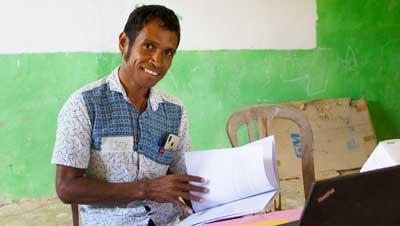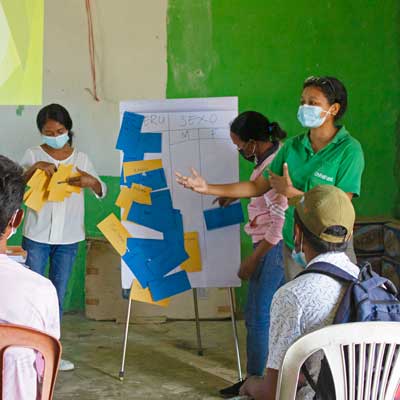Children and families in Papua New Guinea (PNG) are facing a devastating third wave of COVID-19 as the Delta strain sweeps across the country, overwhelming the already fragile healthcare system. To stem the spread, the country has been placed in a two-week lockdown. This follows a major spike in March and April of this year.
There are 26,895 officially confirmed cases and 335 deaths, with the PNG government reporting that every major hospital is being inundated with cases. The country is recording 300 to 400 new cases a day, but it’s expected that the real numbers are much higher.
Low testing rates combined with extremely low vaccination rates – less than 1% of the eligible population is fully vaccinated – mean Delta is putting the healthcare system under significant stress.
ChildFund PNG is concerned that with an overwhelmed healthcare system, children and families will not be able to access the healthcare they need – especially those in remote areas with already limited facilities.
For children and families who contract the virus, accessing healthcare is an uphill battle. Busy medical centres have meant that it is increasingly difficult to access health services for common illnesses in PNG such as tuberculosis (TB), and maternal care.
“Health facilities in Port Moresby are overwhelmed in responding to the increased number of cases in COVID-19. The hospital wards are full of COVID-19 cases and services have now scaled back to only treat to emergency cases. Healthcare workers are overworked and routine services are not there for people to access,” said Olive Oa, Health Program Manager at ChildFund Papua New Guinea.
Many of those testing positive for COVID-19 are healthcare workers. Once infected, healthcare workers must stay home to prevent further spread, leaving hospitals and medical centres even more short-staffed and adding further stress to the healthcare system.
“Health facilities are experiencing major shortage of manpower. For those few staff who are not be infected continue to work almost 24 hours doing testing and care for those diagnosed with the virus,” said Olive.
For children and families living in remote communities, the circumstances are even more challenging. There are reports of individuals being turned away from their local clinics because facilities have been converted to spaces for testing and treating COVID-19 patients.
“There are several cases of patients, children and mothers not being attended to. There are children, including newborn babies, being turned away with their mother as they try to come for their routine vaccinations,” said Olive.
Widespread vaccine hesitancy in PNG has slowed the vaccine rollout. “The information that people have about the COVID-19 vaccine isn’t so clear right now, particularly on social media. There needs to be more work on promoting vaccines,” said Olive.
ChildFund is sharing lifesaving health information with families in rural areas to ensure that they can keep themselves safe through the pandemic. ChildFund has also repurposed one of the TB medical centres to COVID-19 test centre to identify, treat and isolate cases of community transmission.
The health team has been working since the start of the pandemic to promote vaccine information, good hygiene practices, and social distancing. The team has also been working with local partners to build the capacity of community health volunteers to respond to the health crisis.
You can help children and families in PNG facing the deadly virus. Donate now and you could support vulnerable children and families caught in this deadly crisis.































